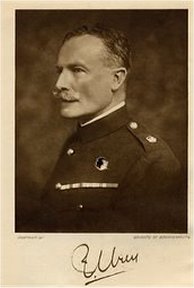P.C. Wren
| Percival Christopher Wren | |
|---|---|

Percival Christopher Wren c. 1925
|
|
| Born | Percival Christopher Wren 1 November 1875 Deptford, South London, England United Kingdom |
| Died | 22 November 1941 (aged 66) |
| Occupation | Author, educator |
| Nationality | British |
| Alma mater | St Catherine's Society (St Catherine's College, Oxford) |
| Notable works | Beau Geste (1924) |
| Spouse |
|
| Children |
|
Percival Christopher Wren (1 November 1875 – 22 November 1941) was an English writer, mostly of adventure fiction. He is remembered best for Beau Geste, a much-filmed book of 1924, involving the French Foreign Legion in North Africa. This was one of 33 novels and short story collections that he wrote, mostly dealing with colonial soldiering in Africa.
Percival Christopher Wren was born in Deptford, South London, England, the son of a schoolmaster. His literary influences included Frederick Marryat, R. M. Ballantyne, G. A. Henty, and H. Rider Haggard. He graduated with a Master of Arts degree from St Catherine's Society, now St Catherine's College, Oxford but then a non-collegiate institution for poorer students. Wren subsequently claimed to have worked as a navvy, deckhand costermonger and fairground boxer during a three-year period between school and Oxford, as well as enlisting briefly as a cavalry trooper in the Queen's Bays (2nd Dragoon Guards).
Wren worked as a boarding school teacher for a few years, during which he married Alice Shovelier, and had a daughter (Estelle, born 1901). In 1903, he joined the Indian Education Service as headmaster of Karachi High School. Between 1903 and 1907 he also worked with the Educational Inspectorate for Sind and lectured at a teachers' training college.
The only documented record of Wren's military service records his appointment on 1 December 1914 as a reserve officer attached to an Indian infantry regiment - the 101st Grenadiers. This unit served in German East Africa but Captain Wren is recorded as having been on sick leave from 17 February 1915 and leaving the Officers Reserve to return to civil employment in October of that year. Wren's obituaries refer to earlier service with the Poona Volunteer Rifles but this reflects confusion with another officer of the same name.
...
Wikipedia
